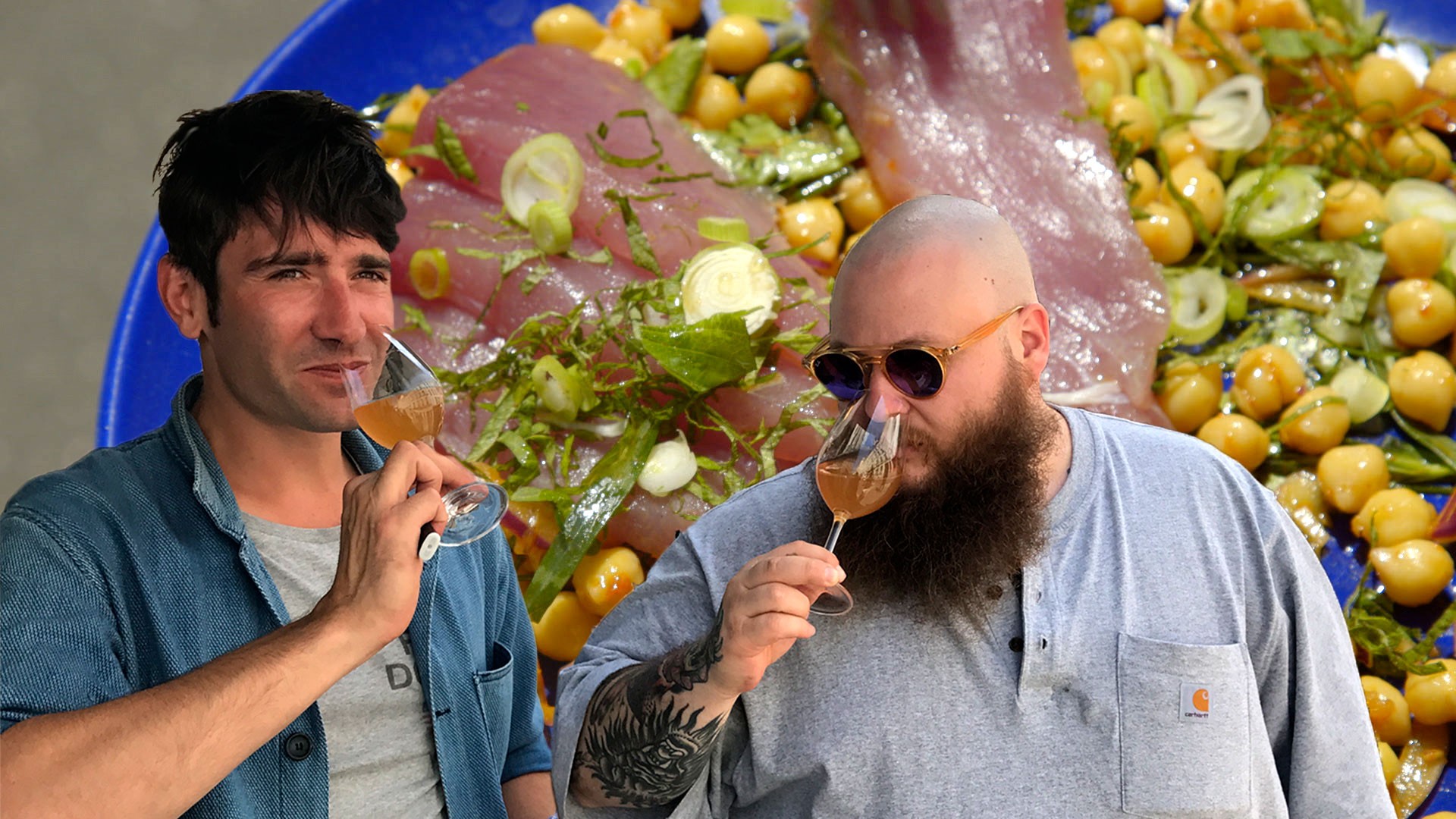Clay McLachlan/Getty Images
Nowadays, like sex, “organic” can sell nearly anything, and wine is no different. But organic doesn’t cover everything that goes into a bottle of wine. “[Organic] only takes the environment into account,” Paul Clifton, head winemaker at Hahn Family Wine, told MUNCHIES. “It doesn't take losing your entire crop and potentially going bankrupt into account, or the people working in your vineyards.” In the mid-nineties, producers out in the Central Coast of California, Clifton among them, realized there was something missing from their certification process. After several years of collaboration, Sustainability in Practice (SIP), now in its tenth year, was launched. SIP focuses on three pillars of sustainability: People, Planet, and Prosperity, and focuses on making sure that wineries build systems that consider the environment, their workers, and the future into account.I first met Steve McIntyre of McIntyre Vineyards, one of the founders of the program, at his windswept vineyard in the Santa Lucia Highlands region of California. “[Environmentalism] was somewhat of a think point, with the Robert Mondavi Winery leading the way,” he tells me about the genesis of the program. “They brought big groups of growers together to talk about best management practices that might have some value, and to start to discuss the notion of sustainability. It really hadn't been coined as a term at that point.”Simultaneously, growers under the Mondavi umbrella in Lodi were creating a workbook that served a self-assessment tool for vineyard practices, which was soon adapted by this emerging group. “It's not a competition between growers,” clarified McIntyre. “It’s competition with yourself to see if you have advanced your score each year,” creating an “index of sustainability.” As the program evolved, McIntyre and other leaders began talking about certifying the wines, but didn’t receive much support at first in the retail world. Surprisingly, it was Walmart and Costco that eventually got behind the program, which was quite a boon for these wineries. “It really was a top-down type of approach,” said McIntyre. “We were interested in doing it, but once you got the big boys saying ‘hey, we think this great idea and we want you to do it,’ it was a whole new ballgame,” he laughed. With this support, SIP officially launched in 2008.The regulations for SIP can be daunting—strict protocols, regular audits by third-party groups, and heavy paperwork—and not easy for wineries to manage. I asked McIntyre why they opted to create a whole new system, rather than go to the USDA—which regulates organic certification in the U.S.—and co-opt some of their practices, or ask to integrate these new ideas into their existing format.And to that end, it’s really the focus on people that distinguishes SIP from other certifications. As the wine industry faces huge labor shortages for myriad reasons—immigration laws, competition from other industries such as the emerging cannabis market—wineries participating in SIP understand how key labor is to the process.
As the program evolved, McIntyre and other leaders began talking about certifying the wines, but didn’t receive much support at first in the retail world. Surprisingly, it was Walmart and Costco that eventually got behind the program, which was quite a boon for these wineries. “It really was a top-down type of approach,” said McIntyre. “We were interested in doing it, but once you got the big boys saying ‘hey, we think this great idea and we want you to do it,’ it was a whole new ballgame,” he laughed. With this support, SIP officially launched in 2008.The regulations for SIP can be daunting—strict protocols, regular audits by third-party groups, and heavy paperwork—and not easy for wineries to manage. I asked McIntyre why they opted to create a whole new system, rather than go to the USDA—which regulates organic certification in the U.S.—and co-opt some of their practices, or ask to integrate these new ideas into their existing format.And to that end, it’s really the focus on people that distinguishes SIP from other certifications. As the wine industry faces huge labor shortages for myriad reasons—immigration laws, competition from other industries such as the emerging cannabis market—wineries participating in SIP understand how key labor is to the process. SIP-certified wineries like Hahn offer benefits like medical insurance, retirement packages, and ongoing training (as well as fair wages). Izzy Silva, Hahn’s cellar and lab coordinator, started working in the wine industry straight out of high school: “Honestly, I was kind of lost and didn’t know what to do,” he explained, and quickly fell in love with the dynamic industry that was evolving at his doorstep. After several years with other estates, he joined Hahn six years ago as a cellar worker, and was promoted to lab work a year later. At that point, he identified his career path and began taking courses through the U.C. Davis wine extension program—with all expenses funded by Hahn.While an extreme example of continuing education, this level of dedication to the worker is a testament to not only Hahn but the SIP program. Silva noted that at other wineries, “you get a work order and you go do it; you move wine from point A to point B, and that's it. With Hahn, we actually take the time to explain to our employees, why is it that you’re doing this?”
SIP-certified wineries like Hahn offer benefits like medical insurance, retirement packages, and ongoing training (as well as fair wages). Izzy Silva, Hahn’s cellar and lab coordinator, started working in the wine industry straight out of high school: “Honestly, I was kind of lost and didn’t know what to do,” he explained, and quickly fell in love with the dynamic industry that was evolving at his doorstep. After several years with other estates, he joined Hahn six years ago as a cellar worker, and was promoted to lab work a year later. At that point, he identified his career path and began taking courses through the U.C. Davis wine extension program—with all expenses funded by Hahn.While an extreme example of continuing education, this level of dedication to the worker is a testament to not only Hahn but the SIP program. Silva noted that at other wineries, “you get a work order and you go do it; you move wine from point A to point B, and that's it. With Hahn, we actually take the time to explain to our employees, why is it that you’re doing this?”
Advertisement

Advertisement
“That’s a good question,” he mused. After a pause, he said, “If you look at sustainability and the three pillars, you see that certified organic is only really concerned about the environment. We felt that organic or biodynamic or any of these other systems are really subsets of sustainability,” he explained. “Farming organically is farming in a box. It doesn't allow for enough local variability or circumstantial variability to really be a dynamic self-correcting system well into the future.”The prosperity pillar is critical to turning wineries into self-correcting systems. While prosperity may seem kind of like an obvious component of any business—who doesn’t want to be profitable?—financial well-being is meant to support the rest of the structure, not just be a standalone goal. A profitable winery can (and should, per SIP’s adherents) continue to invest in new research and technology to advance viticulture research and development. Global warming is absolutely affecting wine regions across the world; regardless of whether an estate has centuries or merely a couple of decades behind them, the legacy will be lost unless they can adapt short-term (and hopefully discover long-term solutions). More importantly, as Clifton from Hahn pointed out, paying workers fair wages and supporting their welfare can only be accomplished by being profitable. “We lean towards sustainability because there’s harmony between those three elements,” said Clifton.
Advertisement

Education leads to empowerment; “[By understanding] winemaking processes, there are times when some of our employees in the cellar bring up things like, ‘hey, don't forget, we normally have do this around this time’ and it's like, ‘oh man, you're right,’” said Silva. “With so much going on, there are times where things do slip through the cracks, and they're the ones to point it out.”Teams hold monthly meetings about sustainability so they can maintain and evolve practices. Even small gestures, such as providing all employees with reusable water bottles, show how the company infuses its ethos through all aspects of the business.Although the big box stores were the catalyst for the certification, at lot has changed in ten years; does the label resonate in today’s natural wine/DEMETER certified/organic/organically grown grapes/certified sustainable alphabet soup? I put this question to Doug Bell, Senior Global Director of Beverage for Whole Foods, whose clientele you'd expect to be rather attuned to the different certifications. “SIP is very important as it focuses not only on protecting the environment, but also that human resources are protected,” Bell wrote in an email, “and that’s a complex message and complex process that can’t be explained on the back of a wine bottle or through a logo or symbol. With the proper messaging and education, SIP and other lesser known (but very key) certifications could become key considerations for customer decision-making in the wine aisle.” Bell adds that the certification absolutely factors into Whole Foods’ buying decisions, showing its potential influence.McIntyre acknowledges SIP is still small in scale, but he’s not concerned. He thinks the SIP template can be adopted by other agricultural sectors, or they’ll implement segments into their own practices. Either way, “I really think we're going to move the needle,” he said. “They'll be able to adopt what… the grape growers have done in terms of a template and we'll all be better off. The program will get much bigger, is our hope.”